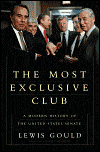The Sad Decline of the United States Senate


Equally disheartening was the Senate’s failure to respond to the allegations of torture at Abu Ghraib prison in Iraq in the spring of 2004. The Senate Armed Services Committee took a brief look at the episode and then backed away from a further inquiry. Republicans in control of the committee did not want to embarrass the administration in an election year. Their pusillanimity contrasted with events half-century earlier when Richard Russell and the Armed Services Committee conducted a significant probe into American strategy in the Far East in the wake of the firing of General Douglas MacArthur in April 1951. Senators had once boasted of their independence from the executive. The tacit endorsement by the Armed Services panel of torture and barbarism as instruments of national policy showed how much the Senate had changed in modern times.
Indeed, in the first five years of the 21st century, the Senate seems to be driven primarily by partisanship and pork. The Republican majority has moved in lockstep with the White House and tolerated few signs of dissent within its ranks. Democrats have been more divided and less effectual.
Many of the Senate’s other flaws have become more visible as well. The incessant pursuit of reelection accelerated the already out-of-control fund-raising process that gave lobbyists and special interest ever greater influence with the members. Enactment of the McCain-Feingold campaign reform legislation in 2002 has done little to improve this situation. The ethical tone of the Senate has also coarsened in ways that Gilded Age members would have understood. Nepotism, cozy ties with businesses, and illicit campaign contributions marred the records of senators of both parties. Members who came to the chamber without personal wealth have transformed their new power and influence into financial opportunities in ways that Lyndon Johnson would have admired. Both Republican and Democratic members found ways to turn their political clout into personal profit. The “millionaires club” of the early twentieth century had received a new lease on life a century later.
The passage of a measure to change bankruptcy laws in the winter of 2005 showed the Senate’s extraordinary deference to business interests and large contributors. Written to assist the powerful credit card industry, the law attracted the united support of Republicans and key defections from Democrats who represented states where credit card firms and insurance companies were dominant. The debate on the proposed legislation was designed to avoid attracting public notice and the bill passed easily once proponents invoked cloture to end a filibuster.
In purely practical terms, the modern Senate, like the House, seems incapable of performing its constitutionally-assigned tasks in an orderly manner in any given year. Appropriation bills rarely are finished on time, continuing resolutions substitute for completed legislation on budget issues, and deadlines for mandated actions regularly slip away. In the expedient process, members craft raids on the treasury and enact measures that do little to advance the national interest.
Perhaps not surprising, contemporary criticisms of the Senate and its member have come to sound very much like those levied in the time of Nelson Aldrich and “The Four.” A majority of modern senators are wealthy and live apart from the every day experience of their voters. Higher salaries and abundant fringe benefits, including very generous medical insurance beyond the reach of the average citizen, further insulate even the most folksy lawmakers from the realities of life. No David Graham Phillips has come forward to level allegations of systemic corruption in the Senate, but modern muckrakers would likely find a receptive audience for such a campaign.
The framers of the Constitution had envisioned a Senate that would function as a wise and judicious check on both executive power and the House of Representatives. They did not imagine a body that would act as a rubber stamp for an incumbent president. Nor would they have been pleased to see the Senate so focused on allocating federal appropriations for contributors and constituents. While the members paid lip service to their constitutional obligations, they had largely forsaken them as a practical matter. By 2005, the Senate had become more often an impediment to democratic government rather than a place to express sober second thought on national priorities The upper house has outlived its usefulness as a restraint on popular excesses and has emerged as an enemy of effective governance.
Related LinksHNN Interview: Lewis Gould
From the Book, The Most Exclusive Club: A Modern History of the United States Senate by Lewis L. Gould. Copyright 2005. Reprinted by arrangement with Basic Books, a member of the Perseus Books Group . All rights reserved.
